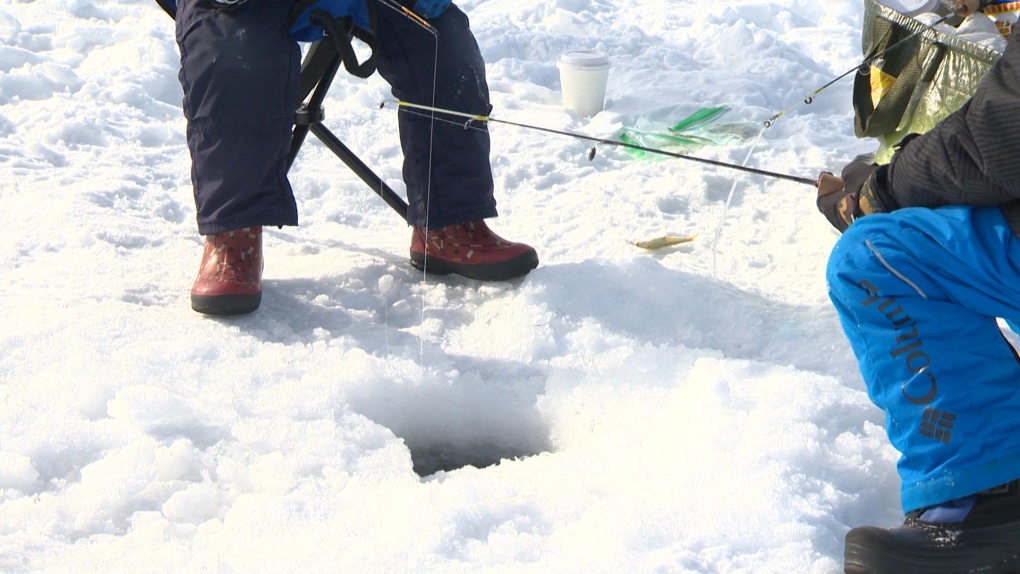How to stay safe on Manitoba's frozen rivers and lakes

Many Manitobans enjoy spending time on the province’s frozen rivers and lakes for some winter fun; however, these activities can turn dangerous if the proper safety measures aren’t taken.
Rick Gergatz, the administrator for the Lake Winnipeg Ice Report, said before you head out on the ice, it’s important to check weather reports.
He noted the thickness of the ice is not currently a safety issue, but rather snow cover, transportation, travel safety, and exposure are the main risks right now.
“Right now the ice is very thick,” he said in an interview on Friday.
“We’ve got three feet of ice in most areas of the lake and on the Red River as well, unless you’re right in the city of Winnipeg itself where other factors can influence the thickness of the ice.”
Once you arrive at the frozen body of water, it’s important to look for a safe path to where you want to go.
Gergatz said in the past, Manitobans would use their daily driver to travel to their fishing spot on the lake. However, they can’t do that this year.
“The amount of snow cover that we have this year, you cannot do that anymore from now on, probably until the end of the season,” he said.
Gergatz emphasized that it is important to have the proper mode of transportation.
“If you’re going out, it’s just like anything else, you need to be prepared,” he said.
He recommends people going ice fishing with their vehicles take a shovel.
“You need a long, strong steel shovel,” Gergatz said.
“One that can reach halfway underneath the vehicle itself.”
He also recommends that people wear warm clothing, make sure their cellphones are charged, and have a full tank of gas.
- With files from CTV’s Katherine Dow.
CTVNews.ca Top Stories

BREAKING Donald Trump picks former U.S. congressman Pete Hoekstra as ambassador to Canada
U.S. president-elect Donald Trump has nominated former diplomat and U.S. congressman Pete Hoekstra to be the American ambassador to Canada.
Genetic evidence backs up COVID-19 origin theory that pandemic started in seafood market
A group of researchers say they have more evidence to suggest the COVID-19 pandemic started in a Chinese seafood market where it spread from infected animals to humans. The evidence is laid out in a recent study published in Cell, a scientific journal, nearly five years after the first known COVID-19 outbreak.
This is how much money you need to make to buy a house in Canada's largest cities
The average salary needed to buy a home keeps inching down in cities across Canada, according to the latest data.
'My two daughters were sleeping': London Ont. family in shock after their home riddled with gunfire
A London father and son they’re shocked and confused after their home was riddled with bullets while young children were sleeping inside.
Smuggler arrested with 300 tarantulas strapped to his body
Police in Peru have arrested a man caught trying to leave the country with 320 tarantulas, 110 centipedes and nine bullet ants strapped to his body.
Boissonnault out of cabinet to 'focus on clearing the allegations,' Trudeau announces
Prime Minister Justin Trudeau has announced embattled minister Randy Boissonnault is out of cabinet.
Baby dies after being reported missing in midtown Toronto: police
A four-month-old baby is dead after what Toronto police are calling a “suspicious incident” at a Toronto Community Housing building in the city’s midtown area on Wednesday afternoon.
Sask. woman who refused to provide breath sample did not break the law, court finds
A Saskatchewan woman who refused to provide a breath sample after being stopped by police in Regina did not break the law – as the officer's request was deemed not lawful given the circumstances.
Parole board reverses decision and will allow families of Paul Bernardo's victims to attend upcoming parole hearing in person
The families of the victims of Paul Bernardo will be allowed to attend the serial killer’s upcoming parole hearing in person, the Parole Board of Canada (PBC) says.


































